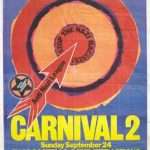A first gig
Listeners to tonight’s John Creedon programme were sending in memories of the first music concert they had attended. Talk of concerts in places like Thurles seemed tame stuff compared with a moment thirty-eight years ago. Being one of one hundred thousand on 24th September 1978 remains a memory fresher than most moments since.
The Anti-Nazi League, which had held a huge march against the National Front the previous April had again called for support for a huge Rock Against Racism event in London. The march was to assemble at Hyde Park and walk to Brockwell Park in Brixton. A bus had been organized from Bridgwater in Somerset and was full. The sun shone and there was a carnival mood.
The crowd was huge by the time we reached London. Trotskyites handed out leaflets encouraging people not to walk to Brixton, but to join them in going to Brick Lane to kick a National Front demonstration off the streets. Even at the age of seventeen, it didn’t take long to work out that the Front would have been delighted at television news pictures depicting them as the victims of Left-wing thugs. The huge peaceful, multiracial gathering was a far more potent signal to the world than throwing bricks at skinheads, who had only gone there looking for a fight anyway. I hadn’t discovered the writings of that greatest of ant-racists, Martin Luther King, in those days; in retrospect, the peaceful path wasn’t just dodging a fight, it was the morally correct choice.
The march moved slowly and took hours to cross London on a warm, bright afternoon. It was tee shirt and jeans weather, which brought out the best in people’s nature. One Left wing group marching together even toned down the language of their chants when a very well spoken, Home Counties lady said to them that she had brought her daughter on the march and that she really didn’t want her daughter to have to listen to bad language.
There was laughter and music and a sense of collective purpose. Bands led trade union banners and street entertainers moved through the crowd. At a street in Brixton, pink banner hung from the upper windows of a house, “Brixton Gays Welcome the Anti-Nazi League”. It hadn’t occurred to a seventeen year old rustic that Nazi hatred was spread around; like those of Dr Martin Luther-King, Pastor Martin Niemoller’s writings were a thing still to be discovered. Looking back on that day, perhaps Niemoller’s poem expresses the need for such a huge coalition:
When the Nazis came for the communists,
I remained silent;
I was not a communist.When they locked up the social democrats,
I remained silent;
I was not a social democrat.When they came for the trade unionists,
I did not speak out;
I was not a trade unionist.When they came for the Jews,
I remained silent;
I wasn’t a Jew.When they came for me,
there was no one left to speak out.
His list could have been supplemented with gypsies and Freemasons and gays, and anyone else who dared to speak out or tried to hold on to liberal values.
The march reached Brockwell Park where four bands were billed to play: Sham 69, Elvis Costello and the Attractions, Aswad and Misty. For some reason, Sham 69 were banned by the police from playing; lead singer Jimmy Pursey made a rousing speech instead, which probably had all the more effect because he had been barred from performing.
We sat on that warm autumn afternoon, a rainbow people.
There are no memories of coming home; no memories of where we found the bus; no memories of that huge crowd dispersing. Perhaps it is good that the memory stops where it does: the sun shining, the music playing, and people believing that together they can build a better world.
Thurles had nothing on Brixton.



Comments
A first gig — No Comments
HTML tags allowed in your comment: <a href="" title=""> <abbr title=""> <acronym title=""> <b> <blockquote cite=""> <cite> <code> <del datetime=""> <em> <i> <q cite=""> <s> <strike> <strong>